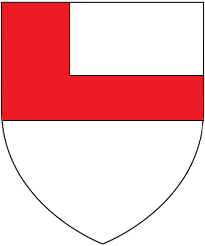Related Research Articles

John Beaufort, 1st Duke of Somerset, 3rd Earl of Somerset, KG was an English nobleman and military commander during the Hundred Years' War. He was the maternal grandfather of Henry VII.

Richard Neville, 5th Earl of Salisbury was an English nobleman and magnate based in northern England who became a key supporter of the House of York during the early years of the Wars of the Roses. He was the father of Richard Neville, 16th Earl of Warwick, the "Kingmaker".

Ralph Neville, 1st Earl of WestmorlandEarl Marshal, was an English nobleman of the House of Neville.

John Holland, 2nd Duke of Exeter, 2nd Earl of Huntingdon, was an English nobleman and military commander during the Hundred Years' War. His father, the 1st Duke of Exeter, was a maternal half-brother to Richard II of England, and was executed after King Richard's deposition. The Holland family estates and titles were forfeited, but John was able to recover them by dedicating his career to royal service. Holland rendered great assistance to his cousin Henry V in his conquest of France, fighting both on land and on the sea. He was marshal and admiral of England and governor of Aquitaine under Henry VI.

Sir John Scott, JP of Scot's Hall in Smeeth was a Kent landowner, and committed supporter of the House of York. Among other offices, he served as Comptroller of the Household to Edward IV, and lieutenant to the Lord Warden of the Cinque Ports.

Robert Willoughby, 6th Baron Willoughby de Eresby was an English nobleman and military commander in the Hundred Years' War.

Margaret Stafford was the daughter of Hugh de Stafford, 2nd Earl of Stafford, and Philippa de Beauchamp. She was the first wife of Ralph Neville, 1st Earl of Westmorland, and the grandmother of the 2nd Earl.
Sir William Hussey of Sleaford, Lincolnshire, SL was an English lawyer who served as Attorney General and as Chief Justice of the King's Bench.

Richard de Vere, 11th Earl of OxfordKG was the son and heir of Aubrey de Vere, 10th Earl of Oxford. He took part in the trial of Richard, Earl of Cambridge, and Lord Scrope for their part in the Southampton Plot, and was one of the commanders at Agincourt in 1415.
John Sackville MP was a member of parliament for East Grinstead, and a local administrator in Essex, Sussex and Surrey. His first wife was Margaret Boleyn, an aunt of Henry VIII's second Queen, Anne Boleyn, and a great-aunt of Queen Elizabeth I.
Sir John Juyn, SL, was an English judge who served as Chief Justice of the King's Bench (1439–40).
William Cheyne may refer to:

Robert Willoughby, 1st Baron Willoughby de Broke, de jure 9th Baron Latimer, KG, of Brook, near Westbury, Wiltshire, was one of the chief commanders of the royal forces of King Henry VII against the Cornish rebellion of 1497.

The chief justice of the Common Pleas for Ireland was the presiding judge of the Court of Common Pleas in Ireland, which was known in its early years as the Court of Common Bench, or simply as "the Bench", or "the Dublin bench". It was one of the senior courts of common law in Ireland, and was a mirror of the Court of Common Pleas in England. The Court of Common Pleas was one of the "four courts" which sat in the building in Dublin which is still known as the Four Courts, apart from a period in the fourteenth century when it relocated to Carlow, which was thought to be both more central and more secure for the rulers of Norman Ireland.

William Paston, the only son of Clement Paston and Beatrice Somerton, had a distinguished career as a lawyer and Justice of the Common Pleas. He acquired considerable property, and is considered "the real founder of the Paston family fortunes".
Robert Waterton was a trusted servant of the House of Lancaster under three monarchs, Henry IV, Henry V, and Henry VI. As Constable of Pontefract Castle, he had custody of Richard II after that king was deposed.
Sir Richard Arches, of Eythrope, in the parish of Waddesdon, Buckinghamshire, was MP for Buckinghamshire in 1402. He was knighted before 1401.

Richard Wydeville was an English landowner, soldier, diplomat, administrator and politician. His son married an aunt of King Henry VI and they were the parents of the wife of the next king, Edward IV.

John Stourton of Preston Plucknett in Somerset was seven times MP for Somerset, in 1419, 1420, December 1421, 1423, 1426, 1429 and 1435.
Sir Robert I Hill, sometimes written Hull, was an English politician and judge from the West Country.
References
- 1 2 3 4 5 6 7 Powell, Edward (2004). "Cheyne, Sir William (d. 1443)". Oxford Dictionary of National Biography. Oxford: Oxford University Press (subscription required). doi:10.1093/ref:odnb/5264.
- ↑ Roskell, John Smith; Linda Clark; Carole Rawcliffe (1992). The House of Commons, 1386-1421. The History of Parliament. Vol. i. Stroud: Sutton. pp. 557–9. ISBN 0-86299-943-X.